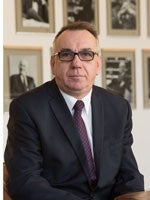On Feb. 4, more than 70 Harvard Law School students, faculty, and other members of the Harvard community gathered in Wasserstein Hall to hear Dr. Enver Hasani, president of the Constitutional Court of Kosovo, speak on “European Self-Determination and the Advisory Opinion of the International Court of Justice on Kosovo.”
The nine-member Constitutional Court of Kosovo was established in 2009 as the final authority on the interpretation of the Republic of Kosovo’s constitution. Before his appointment to the court, Hasani was the head of Kosovo’s newly established Office of Foreign Relations, a legal advisor in the Ministry of Foreign Affairs of the Republic of Albania, and a delegate to the Rambouillet Conference on Kosovo. He has also served as rector, dean of the faculty of law, founder and head of the Human Rights Centre, and professor of international Law and international Relations at the University of Prishtina.
In his HLS talk, Hasani traced the evolution of nation-building from the Renaissance to the Napoleonic Wars, then turned to the making and unmaking of the former Yugoslavia, from the Versailles Peace Conference in 1918 to the dissolution of the Soviet Union in the early 1990s, the ensuing conflict in Kosovo, and the new republic’s declaration of independence in February 2008. He focused next on the U.N. General Assembly’s request, at the behest of the government of Serbia, for an advisory opinion by the International Court of Justice on the legality of the declaration under international law. “This is an opinion that everyone who studies public international law has to confront or think about,” said Mark Tushnet, William Nelson Cromwell Professor of Law, who introduced Hasani at the event.
The U.N. resolution asked the ICJ to consider whether “the unilateral declaration of independence by the Provisional Institutions of Self-Government of Kosovo [is] in accordance with international law.” In rendering its opinion, Hasani said, “The court in a very eloquent way used its legal powers to reframe the question,” determining that authors of the declaration were representatives of the people of Kosovo and not an official body bound by the constitutional framework created by the U.N. Interim Administration Mission in Kosovo. In ruling that the declaration did not in itself violate international law, Hasani explained, “the ICJ made a distinction between constitutive and constitutional power,” and affirmed that “the issue of the creation of states through secession or other means is a matter of fact, not a matter of law.”
The talk led to questions from the audience about Serbia’s motives for challenging the Republic of Kosovo’s bid for independence and the possible implications of the controversial ICJ ruling for separatist movements in other countries.
Hasani’s visit, which was organized by International Legal Studies, provided a welcome opportunity for one HLS alumnus to return to campus and reconnect with the jurist. David Palko ’12, who is currently clerking for Judge Michael S. Kanne of the U.S. Court of Appeals for the Seventh Circuit, spent the summer of 2010 as a Chayes International Public Service Fellow, working at the Constitutional Court of Kosovo at the end of the court’s first judicial year. “[Hasani] is a great leader for a court that is looking at things for the first time,” Palko said.
